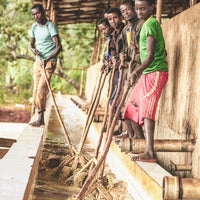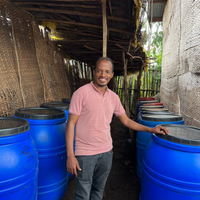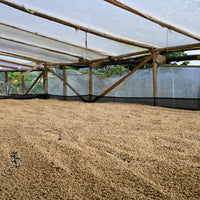Origin: El Salvador
Region: Santa Ana
Altitude: 1500 - 1550 meters above sea level
Farm: Chalchuapa, La Cumbre
Farm Size: 70 hectares
Owner: Emilio Lopez and Jose Roberto Santamaria
Variety: Caturra
Process: Natural
Tasting Notes: Sweet and syrupy with notes of melon, red apple and chocolate.
La Cumbre (the top) is the highest section of Finca El Manzano, where the best of Emilio’s coffees are found. Established in 1872, Finca El Manzano has remained under the stewardship of the López Díaz family for an impressive span of seven generations. In 2005, Emilio López Díaz undertook an expansion of El Manzano by erecting a processing mill, thereby affording him precise control over every facet of production. This visionary move also witnessed the introduction of unconventional varieties, such as SL-34 and Geisha, which were previously absent in the Salvadoran coffee landscape.
As a testament to these enhancements, Emilio's Geisha took both 1st and 2nd positions during the 2018 Cup of Excellence competition—an unprecedented feat. The diligence exhibited by Emilio and his team in El Manzano's processing operations is evident. Each delivery of cherry undergoes rigorous assessment based on its sugar content prior to acceptance. This data subsequently guides the determination of optimal drying periods, ensuring uniform quality among daily lots and a consistently remarkable cup profile.
Don’t be fooled by El Salvador’s small size. It was once the 4th largest coffee producer worldwide and continues to produce high quality lots. The country is known for its great cupping varieties, such as Bourbon and Pacamara. In fact, two beloved, frequently high-scoring varieties—Pacas and Pacamara— originated in El Salvador.
Unlike other countries, where specialty coffee production has required a great deal of additional investment and training, El Salvador already has a broad and skilled specialty coffee workforce. Farming traditions run deep, and many Salvadorian farmers are extremely passionate about coffee production and continuously strive to improve their crop. El Salvador has optimal conditions for coffee processing. The prolonged dry season typically occurs during the harvest season, making it easier to sun dry coffee.
Though coffee output in the country has been declining for over two decades – exacerbated by the CLR crisis – the approach to coffee production has changed from volume- to quality-driven. A new generation of coffee producers has sprouted around the country with a new vision and approach to production. Many of this generation are experimenting with processing and varietals.







